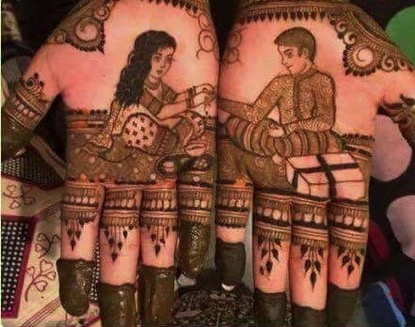Raksha means protection and bandhan means bond, so it means a bond of protection. Siblings celebrate this day together and start in the morning by sisters blessing their brother with tikka in the middle of their forehead . They make a dot with a mixture of saffron and rice grains. Then she ties a band around her right wrist and wishes her brother happiness in all areas of life and prays for a long and healthy life.

The god Ganesha is remembered and it is wished that all obstacles be removed.
The ceremony ends with her bringing and feeding her brother something sweet, preferably nuts (almonds) or barfi (which you can make yourself with coconut here and besan here ). The brothers give a gift to their sister. The girls can also give a gift to their brother (optional), but sweets/nuts etc are a must. Today, golden, fine silk threads with beads and other decorations are used but many do not know why the different things are used and what they mean.
Here I have interviewed my mother and a relative in India about Vedic (primordial Indian sacred scriptures about all philosophy of life).
These ingredients are used with the following symbolic meaning:
* Blade of grass: just as a grass seed spreads, so shall my brother's family and reputation spread and grow, green and harmonious. Removing obstacles
* Rice grain: symbol of infinity, unity
* Saffron: spiritual energy
* Sandalwood: good aroma, bring sweetness and calm mind
* Mustard seed: remove bad habits/characteristics, become disciplined and strong
It is not only a cozy ceremony but a way to bring siblings and cousins together. In a sibling group, it is like this out of respect: An older brother is called bhaiya , which means brother. An older sister is called didi , which means elder sister.
Before girls were given inheritance rights, there was a way to share some of the inheritance. Not only royalty, but ordinary people often gave gold and money gifts to girls, especially to those who were married off. This way, the girls received some gold on various holidays and some of the family's inheritance, even though it has become quite equal in India in connection with inheritance rights, girls are probably very spoiled when it comes to holidays and gifts. It can initially be anything from small toys, clothes, equipment, jewelry, etc. It all depends on the brother's finances and generosity.
Here you can see, for example, the latest news, sisters can get henna patterns on their palms to show love/bond to their brother.
Happy Raksha Bandhan to all siblings!

